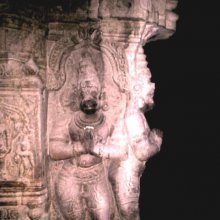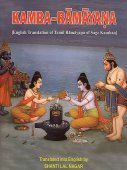Kishkindha, Kiṣkindha, Kiṣkindhā, Kishkimdha: 18 definitions
Introduction:
Kishkindha means something in Hinduism, Sanskrit, Jainism, Prakrit. If you want to know the exact meaning, history, etymology or English translation of this term then check out the descriptions on this page. Add your comment or reference to a book if you want to contribute to this summary article.
The Sanskrit terms Kiṣkindha and Kiṣkindhā can be transliterated into English as Kiskindha or Kishkindha, using the IAST transliteration scheme (?).
Images (photo gallery)
In Hinduism
Purana and Itihasa (epic history)
Source: archive.org: Puranic EncyclopediaKiṣkindhā (किष्किन्धा).—An ancient kingdom of the monkeys in South India. This kingdom is mentioned both in the Rāmāyaṇa and the Mahābhārata. During the Rāmāyaṇa period a monkey King called Ṛkṣarāja was the ruler of Kiṣkindhā. He was childless.
Once upon a time a son called Bāli was born to Aruṇīdevī by Indra, and another son called Sugrīva was born to her by Sūrya. (See under Aruṇa). Both the boys were brought up in the Āśrama of sage Gautama. When they grew up, Indra handed them over to Ṛkṣarāja, and thus Bāli and Sugrīva came to Kiskindhā. After the death of Ṛkṣarāja, Bāli became King of Kiṣkindhā and Sugrīva lived in the service of his brother. At that time there was a very mighty Asura called Dundubhi. Finding no one fit to fight with, he challenged Varuṇa. Varuṇa directed him to Himavān, whose peaks he rent asunder, and played with. Then Himavān told Dundubhi that he was of a peaceful nature and that Bāli would be a match for him (Dundubhi). Accordingly Dundubhi fought with Bāli and got killed. Bāli cast away the corpse of Dundubhi. The blood oozing out from the nose of Dundubhi fell on the body of sage Mataṅga who was engaged in penance on the peak Ṛṣyamūka. Bymeans of his divine powers, the sage found out the origin of the blood contaminating his body, and cursed that Bāli would die the moment he set foot on the mountain. (See full article at Story of Kiṣkindhā from the Puranic encyclopaedia by Vettam Mani)
Source: Cologne Digital Sanskrit Dictionaries: The Purana Index1) Kiṣkindha (किष्किन्ध).—A Vindhyan tribe.*
- * Brahmāṇḍa-purāṇa II. 16. 64; Matsya-purāṇa 114. 52; Vāyu-purāṇa 45. 132.
2) Kiṣkindhā (किष्किन्धा).—The capital of Vāli.1 A mountain capital; a tīrtha sacred to Tārā.2
Source: Shodhganga: The saurapurana - a critical studyKiṣkindhā (किष्किन्धा) is the name of a mountain where Sudevī in a previous birth swept the dust near the khaliṅga, according to the 10th century Saurapurāṇa: one of the various Upapurāṇas depicting Śaivism.—Accordingly, “[...] Sudevī, in her previous birth as female vulture, she went to the Kiṣkindhā mountain and swept the dust near the khaliṅga of Śiva by means of the wind of her wings while trying to take the offering made there and how, after death, she was born as the daughter of Vasu and married to King Naravarman”.

The Purana (पुराण, purāṇas) refers to Sanskrit literature preserving ancient India’s vast cultural history, including historical legends, religious ceremonies, various arts and sciences. The eighteen mahapuranas total over 400,000 shlokas (metrical couplets) and date to at least several centuries BCE.
Shaktism (Shakta philosophy)
Source: Google Books: ManthanabhairavatantramKiṣkindha (किष्किन्ध) (identified with the region around modern Hampi, which roughly corresponds to the medieval kingdom of Vijayanagara) refers to one of the ten places visited by the Goddess on her pilgrimage, according to Tantric texts such as the Kubjikāmata-tantra, the earliest popular and most authoritative Tantra of the Kubjikā cult.—Accordingly, when the goddess emerges out of the Liṅga, she reluctantly leaves the beautiful Island of the Moon she loves. She sets out on the pilgrimage Bhairava has ordained for her to spread the Command and to finally unite with him. She will go to ten places (i.e., Kiṣkindha), all of which are already sacred sites where goddesses reside.
Note: Kiṣkindha, famous in the Rāmāyaṇa for the forest in which Rāma meets Hanumān and the monkey tribe who help him in his quest for Sitā.

Shakta (शाक्त, śākta) or Shaktism (śāktism) represents a tradition of Hinduism where the Goddess (Devi) is revered and worshipped. Shakta literature includes a range of scriptures, including various Agamas and Tantras, although its roots may be traced back to the Vedas.
Jyotisha (astronomy and astrology)
Source: Wisdom Library: Brihat Samhita by VarahamihiraKiṣkindha (किष्किन्ध) refers to a country belonging to “Āgneyī (south-eastern division)” classified under the constellations of Āśleṣā, Maghā and Pūrvaphālguni, according to the system of Kūrmavibhāga, according to the Bṛhatsaṃhitā (chapter 14), an encyclopedic Sanskrit work written by Varāhamihira mainly focusing on the science of ancient Indian astronomy astronomy (Jyotiṣa).—Accordingly, “The countries of the Earth beginning from the centre of Bhāratavarṣa and going round the east, south-east, south, etc., are divided into 9 divisions corresponding to the 27 lunar asterisms at the rate of 3 for each division and beginning from Kṛttikā. The constellations of Āśleṣā, Maghā and Pūrvaphālguni represent the south-eastern division consisting of [i.e., Kiṣkindha] [...]”.

Jyotisha (ज्योतिष, jyotiṣa or jyotish) refers to ‘astronomy’ or “Vedic astrology” and represents the fifth of the six Vedangas (additional sciences to be studied along with the Vedas). Jyotisha concerns itself with the study and prediction of the movements of celestial bodies, in order to calculate the auspicious time for rituals and ceremonies.
General definition (in Hinduism)
Source: WikiPedia: HinduismKishkindhā (किष्किन्धा): Kishkindhā was the kingdom ruled by a Vanara King Sugreeva, the younger brother of Bali, during the Ramayana period. This was the kingdom where he ruled with the assistance of his most intelligent minister, Hanuman.
In Jainism
General definition (in Jainism)
Source: archive.org: The Jaina IconographyKiṣkindhā (किष्किन्धा) or Kiṣkindhānagara is another name for Kākandīnagara, the birth-place of Suvidhinātha: the ninth of twenty-four Tīrthaṃkaras or Jinas.—From patriarchical history, we gather [Suvidhinātha’s] native place was called Kākandīnagara. His father was the ruling prince by the name of Sugrīva and his mother was named Rāmā, his place of Nirvāṇa was Sameta-Śikhara or Mount Pārasnātha. His father was the lord of Kākandī. Curiously, Kākandī is called Kākandīnagara (Sanskrit: Kiṣkindhānagara). Let us remember, his father is called Sugrīva, his mother has the name of Rāmā. All this has curious association with the Rāmāyaṇa. The Kiṣkindha of the Rāmāyaṇa was situated on the sea. Hence, it is evident that aquatic animals like a crocodile or a crab have come to be the emblems of this Tīrthaṃkara.
Source: archive.org: TrisastisalakapurusacaritraKiṣkindhā (किष्किन्धा) is the capital-city of Śrīkaṇṭha established on Vānaradvīpa, according to the Jain Ramayana and chapter 7.1 [origin of the rākṣasavaṃśa and vānaravaṃśa] of Hemacandra’s 11th century Triṣaṣṭiśalākāpuruṣacaritra: an ancient Sanskrit epic poem narrating the history and legends of sixty-three illustrious persons in Jainism.
Accordingly, as Kīrtidhavala said to Śrīkaṇṭha: “[...] Śrīkaṇṭha agreed to live on Vānaradvīpa. After he had founded his capital, named Kiṣkindhā, on Mount Kiṣkindha on Vānaradvīpa, Kīrtidhavala installed him in his kingdom. King Śrīkaṇṭha saw many monkeys roving about on the island. They were handsome, with large bodies, and lived on fruit. He proclaimed that they should not be killed and had food, drink, etc. given them. [...]”.

Jainism is an Indian religion of Dharma whose doctrine revolves around harmlessness (ahimsa) towards every living being. The two major branches (Digambara and Svetambara) of Jainism stimulate self-control (or, shramana, ‘self-reliance’) and spiritual development through a path of peace for the soul to progess to the ultimate goal.
Languages of India and abroad
Sanskrit dictionary
Source: DDSA: The practical Sanskrit-English dictionaryKiṣkindha (किष्किन्ध).—[P.VI.1.157.]
1) Name of a country.
2) Name of a mountain situated in that country.
-ndhā, -ndhyā Name of a city, the capital of Kiṣkindha. किष्किन्धा- काण्डम् (kiṣkindhā- kāṇḍam) Name of the fourth book of Rāmāyaṇa.
Derivable forms: kiṣkindhaḥ (किष्किन्धः).
See also (synonyms): kiṣkindhya.
Source: Cologne Digital Sanskrit Dictionaries: Shabda-Sagara Sanskrit-English DictionaryKiṣkindha (किष्किन्ध).—m.
(-ndhaḥ) A mountain in the south of India, in Mysore, the residence of the monkey prince Bali. f.
(-ndhā) A cave in the mountain; also kiṣkindhya.
Source: Cologne Digital Sanskrit Dictionaries: Benfey Sanskrit-English DictionaryKiṣkindha (किष्किन्ध).—m. The name of a mountain, [Rāmāyaṇa] 4, 8, 37; Mahābhārata 2, 1122.
Source: Cologne Digital Sanskrit Dictionaries: Cappeller Sanskrit-English DictionaryKiṣkindha (किष्किन्ध).—[masculine] [Name] of a mountain, [feminine] ā of a cave in it.
Source: Cologne Digital Sanskrit Dictionaries: Monier-Williams Sanskrit-English Dictionary1) Kiṣkindha (किष्किन्ध):—m. Name of a mountain (in the south of India, in Oḍra, containing a cave, the residence of the monkey-prince Vālin who was slain by Rāma; the territory which is said to be in the northern part of Mysore, near the sources of the Pampā river, was transferred after the conquest by Rāma to Su-grīva, brother of Vālin and rightful king), [Varāha-mihira’s Bṛhat-saṃhitā]
2) m. [plural], ‘Name of a people’ See -gandika
3) Kiṣkindhā (किष्किन्धा):—[from kiṣkindha] f. (gaṇas pāraskarādi and sindhv-ādi), Name of the cave contained in the mountain Kiṣkindha (the city of Vālin and Sugrīva), [Mahābhārata; Rāmāyaṇa]
4) [v.s. ...] Name of the mountain Kiṣkindha.
Source: Cologne Digital Sanskrit Dictionaries: Yates Sanskrit-English DictionaryKiṣkindha (किष्किन्ध):—(ndhaḥ) 1. m. A mountain near Orissa. (ndhyā) f. Cave in it.
Source: DDSA: Paia-sadda-mahannavo; a comprehensive Prakrit Hindi dictionary (S)Kiṣkindhā (किष्किन्धा) in the Sanskrit language is related to the Prakrit word: Kikkiṃdhā.
[Sanskrit to German]
Sanskrit, also spelled संस्कृतम् (saṃskṛtam), is an ancient language of India commonly seen as the grandmother of the Indo-European language family (even English!). Closely allied with Prakrit and Pali, Sanskrit is more exhaustive in both grammar and terms and has the most extensive collection of literature in the world, greatly surpassing its sister-languages Greek and Latin.
Kannada-English dictionary
Source: Alar: Kannada-English corpusKiṣkiṃdha (ಕಿಷ್ಕಿಂಧ):—
1) [noun] the capital city monkey-princes Vāli and Sugrīva of Rāmāyaṇa; the present Hampi, in Beḷḷāry District of Karnāṭaka.
2) [noun] an assemblage of people; a multitude.
3) [noun] (fig.) a very narrow or insufficient place, room, etc.
Kannada is a Dravidian language (as opposed to the Indo-European language family) mainly spoken in the southwestern region of India.
See also (Relevant definitions)
Starts with: Kishkindhadhipa, Kishkindhagandika, Kishkindhaguha, Kishkindhaka, Kishkindhakanda, Kishkindhanagara, Kishkindhapura.
Full-text (+74): Kishkindhya, Kaishkindha, Kishkindhaka, Kishkindhakanda, Sugriva, Valin, Kishkimdhe, Kishkimda, Angada, Kishkindhadhipa, Kishkindhagandika, Madhuvana, Ghanodadhiratha, Kitkintapuri, Riksharajas, Vanara, Kikkimdha, Vali, Dhvajayantra, Sharari.
Relevant text
Search found 25 books and stories containing Kishkindha, Kiṣkindha, Kiṣkindhā, Kishkimdha, Kiskindha, Kiṣkiṃdha, Kiskimdha; (plurals include: Kishkindhas, Kiṣkindhas, Kiṣkindhās, Kishkimdhas, Kiskindhas, Kiṣkiṃdhas, Kiskimdhas). You can also click to the full overview containing English textual excerpts. Below are direct links for the most relevant articles:
Impact of Vedic Culture on Society (by Kaushik Acharya)
Mingling of Cultures (Q): The Kiṣkindhās < [Chapter 4]
Sanskrit Inscriptions (C): Guhilās of Kiṣkindhāpura < [Chapter 3]
4. Religious Aspect of Dāna < [Chapter 2]
Puranic encyclopaedia (by Vettam Mani)
The Gautami Mahatmya (by G. P. Bhatt)
Brihat Samhita (by N. Chidambaram Iyer)
Trishashti Shalaka Purusha Caritra (by Helen M. Johnson)
Part 2: Rāvaṇa’s lineage (vaṃśa) < [Chapter I - Origin of the Rākṣasavaṃśa and Vānaravaṃśa]
Part 5: Expedition of conquest < [Chapter I - Brahmadattacaritra]
Introduction to volume 4 < [Introductions]
Animal Kingdom (Tiryak) in Epics (by Saranya P.S)
Related products


